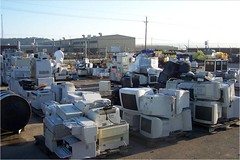 Electronic waste is becoming a serious global problem. By the end of the 20th century, the United States Environmental Protection Agency (EPA) had already called attention to the heaps of computers, monitors, laptops, printers, scanners, keyboards, cell phones, and other consumer electronic devices rapidly piling up in landfills.
Electronic waste is becoming a serious global problem. By the end of the 20th century, the United States Environmental Protection Agency (EPA) had already called attention to the heaps of computers, monitors, laptops, printers, scanners, keyboards, cell phones, and other consumer electronic devices rapidly piling up in landfills.Electronic waste poses plenty of challenges to the environment; from the presence of hazardous substances and heavy metals that seep down into the subsoil, thereby polluting ecosystems, to the ethical issue of failing to recycle a or reuse components that can serve other purposes.
Technology Killed the Desktop PC
The rapid advancement of technology is somewhat to blame for the massive growth of electronic waste in the 21st century, and desktop computers are the number one casualty of this technological progression. Finding a laptop computer that is just as powerful as a desktop is easy these days, and the mobile paradigm of smartphones and tablets is already spelling the end of the desktop.While technological advancements are always welcome, electronic waste is not. The EPA estimates that American consumers get rid of 30 million computers each year, a figure that will certainly keep rising as tablets become the new standard in personal computing. The United Nations estimates that electronic waste will grow by 500 percent by the end of this decade, and discarded computers will be making up its bulk.
Recycling Old Computers
Computer recycling is a major function of electronic waste management, and it is a great option for computer owners who need to dispose of their old desktop or laptops. There are different types of computer recycling.Major desktop manufacturers have their own program that consists of offering consumers an easy way to dispose of their old computers when they buy a new product. These computers are often put back in the market after being refurbished.
Electronic waste recyclers are easy to find these days. Some local outfits offer to pick up old computers for recycling. If the discarded computers are beyond repair or ruefully obsolete, they can still be stripped for parts that are sold to computer repair shops or to scrap yars. Computers are filled with metals that are usually in high demand, such as aluminum, gold and lead.
Some electronic waste recyclers follow business models that actually put cash in the pockets of owners of old computers. The amount given in exchange for old desktops or laptops sometimes amounts of pocket change, but people who leave their old computer in the hands or recyclers can trust that their outdated devices will not go to waste. Some recyclers work with charity organizations that ship refurbished computer hardware to developing countries where they are put to work with the hope of narrowing the digital divide.
Reusing Old Computers
Not only is reusing computers a viable alternative to disposal, it is also a more satisfying and fun option. The idea is to breathe new life into the old computer and keep it in the household while serving a new function. Desktops are versatile machines; they can be transformed into devices that serve a whole new purpose.Repurposing an old computer is a matter of choosing the room of the house that will be augmented by the introduction of a dedicated device. One of the most common repurposing projects for old computers is the digital jukebox. This is a matter of simply reformatting the computer and loading it with nothing but MP3s and a few audio utilities. A useful tip for this project is to choose Linux as the operating system for a speedier jukebox.
In the kitchen, old computers can be turned into fancy electronic recipe books and family communication devices. This project can be made more sophisticated by hiding the old computer in a cabinet and installing a touch screen. You can also reduce the mess buy using cable ties. Young children would love to have their own computer in a playroom dedicated only to playing their favourite games.
Another useful re-purposing project is to turn the computer into a file server or virtual host in homes where networks are already running. Using an old computer exclusively as file server is akin to having a private cloud.
You may also be interested in this article: How to use Linux to rejuvenate old computer.
Article written by Jet Russell. In his spare time Jet does outreach for a custom web design firm. He likes writing about Internet marketing and anything computer related.
Image by U.S. Army Environmental Command, licensed under Creative Commons.
I favor Re-Use over recycling. I make it almost a challenge to wring usefulness out of the oldest piece of technology.
ReplyDeleteThe desktop's NOT dead and won't be for some time to come.
My latest keep is a Toshiba Celeron 366mhz. tower. Loaded with Windows 98, I pop in a Puppy Linux Racy CD and it becomes amazingly useful once again.
Using a laptop from 2001 (Linux Simply Mepis),a laptop from 2003 ( Lubuntu 12.04) and a desktop from 2002 with dual boot WinXP (for 1 app only) and Lubuntu 10.04)
ReplyDeleteThey might not be ´Speedy Gonzalez´ but are all still useful for daily web browsing,e.mail and music
It is amazing that all this old kit has never failed since it was purchased new
Frank in northern Scotland
Installed Linux on all my older laptops... there never seems to be a reason to throw tehm away. Although 2 of them are give away to friends in need.
ReplyDeleteRecycling old computers helps! There are so many ways to do this. I read one article having a few interesting examples on how and what things can be done with old computers. So amazing!
ReplyDelete-TSSGRP.com